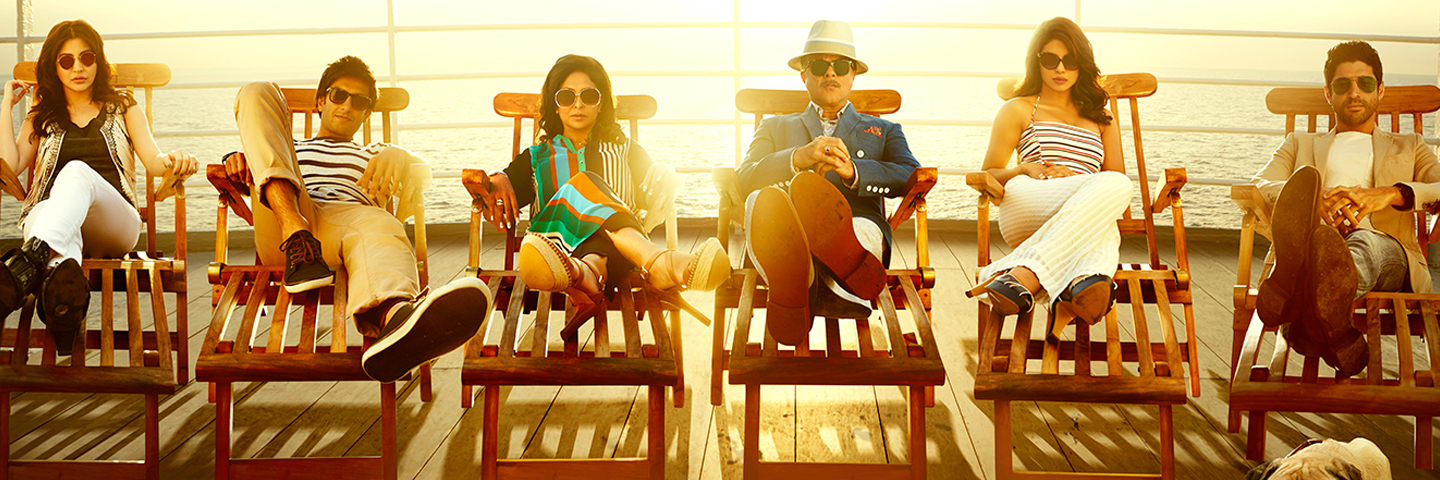Zoya Akhtar can be deservingly counted amongst the most exciting filmmakers working in the Hindi film industry today. She has a novel approach, always something interesting to say, beautiful to show, without ever banking on her cast entirely to make sure her audience leaves, content. Her contributions to her films are evident, even when she manages to cast prominent actors even in the smallest of roles, splurging on the minutest details. While her miraculous debut, "Luck By Chance," was an affectionate, bravely grim and always insightful exploration of the functioning of the Hindi film industry, it was her second film, "Zindagi Na Milegi Dobara," that she made known the kind of cinema she believes in. It is classic escapist cinema; glistening and scenic locales, a barrage of good-looking people at every corner of the frame who wear fashionable clothes but are strangely alienated in their own lives.
"Dil Dhadakne Do" is a contemporary rehash of the genre that Sooraj Barjatya made his decades ago, but it suffers from the same problems that "Zindagi Na Milegi Dobara" did. It has a troop of affluent but mysteriously unlikable characters who say dull things, do dull things, have dull problems and grumble throughout the film in the hopes of solving them, but all of this against the backdrop of a lovely country. It doesn't help their cases much, I'm afraid, that these problems are boringly predictable, and neither does it help our case because our narrator here is a dog.
"Dil Dhadakne Do" kicks off with a voice-over explaining the milieu of each of our four protagonists, and setting up the plot that will go precisely haywire in the next 170 minutes. In the opening minutes, Akhtar cleverly stresses on the problems of each character without overdoing it, and we quickly have a clear picture of what's going on their minds. As the story progresses and finally boards a plush yacht, more and more characters join in, crowding the story as one would expect it to, but each character, each relationship is established rather skillfully. Romance -- furtive, open, expressive, subdued, developing, decaying -- is at the core of the story. People are either falling in love or out of it all over the place, and it gets on one's nerves at a point when it is hard to keep track who is chasing whom. But beside the multiple love angles here, there's also the familial problems that plague the family at the heart of all this. The family in question has a patriarch who is a millionaire but struggling to keep his company afloat, a self-made millionaire daughter who is -- I found this rather interesting -- among the world's ten best entrepreneurs as ranked by Forbes (that's a bit tall, innit?) but who is -- ouch! -- snubbed and overlooked by both her in-laws and parents, and a son who is the heir to the fortune but who wants to do nothing but ride planes. Of course, realism is not something to be found here.
As mentioned before, the story follows the same trajectory that "Zindagi Na Milegi Dobara" did four years ago, only with more simplified characters. It is hard to invest into their troubles emotionally, because these are not characters whom we love or empathize with but the story develops assuming that we are already buying into their grief. That is a major blunder.
Until intermission, "Dil Dhadakne Do" is predictable but reasonably diverting, and the set-up promises a potentially fun second-half. But post-intermission, the story crumbles like a sand castle in a tornado.
There is a limit to how far one can stretch their story till it goes topsy-turvy, and how whiny the characters can get in successive scenes. But this limit is challenged so brashly, it becomes doubly difficult to care about anything any longer. The outcome of each parallel thread can be seen from a mile away, yet we are made to watch as each character struggles to cope with the decaying relationships in their lives. What was foreseen as a potentially amusing set-up swiftly deteriorates into a cluttered mess. Oh, where did the subtlety disappear? It vanishes completely, and everything goes -- painfully -- downhill from there. But the saving grace comes in the form of an adeptly executed scene where empowerment of women is broached. It is a shining star in the phase of the film where homilies on marriage and children are delivered at every turn. We will gladly lap it up.
The performances are nothing to speak of, except Anil Kapoor and Ranveer Singh who give performances so earnest, it manages to salvage the film marginally. But what salvation can be achieved in a film that promised so much, yet achieved so little?
In films that tackle dysfunctional families, it is necessary to create quirky characters that are genuinely affable and earn our sympathies, characters whom we can envision as or hope to be real people. "Dil Dhadakne Do" lacks that. And with an ending that is utterly over-the-top but thankfully not prolonged, it only becomes harder to care for these chicly-dressed but hollow mortals.
This is not a bad film. It has a few bits here and there that are amusing, and a clever voice-over narration that is often introspective. But a handsomely-mounted film cannot redeem certain shortcomings. And the shortcomings are too many to turn a blind eye to. Reviving a dead genre isn't necessarily a bad idea, but it needs to be done right to be effectual. This simply is not.


